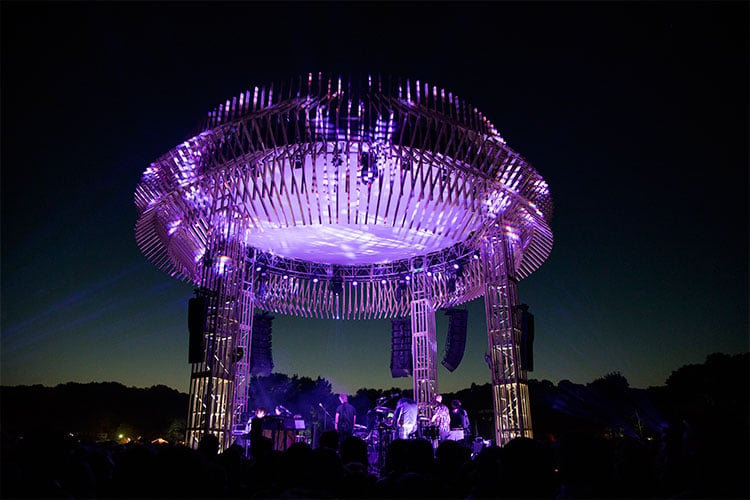Imagine being at the first day of a festival, right as the gates open—actually wanting to be there, an hour before anything even starts. That’s the kind of faith and devotion Justin Vernon and Aaron Dessner are counting on in regards to their yearly Eaux Claires festival. This year, although internet sleuths sussed out a good portion of the lineup in advance, there was no official announcement of any of the artists until 1 p.m. Friday, just as the park opened.
Deep down, most fans probably hoped for a giant reveal, but none was forthcoming; despite booking increasingly big names over the festival’s first three years, “IV” boasted no household name headliners, and there were no audible gasps as fans anxiously perused the schedule. We didn’t hear any groans of disappointment, either. These people bought tickets believing that the core Eaux Claires clique would deliver plenty of musical firepower regardless of what other names they’d draw in. And there were plenty of surprises in store throughout the weekend—just not in terms of celebrity rock stars.
More than any previous year, the spirit of collaboration was going to have to carry the festival to whatever heights it could reach; the excitement arose from wondering who might be jumping onstage with whom, and whether any good music would develop from these spontaneous jams. Fittingly, this year’s opening ceremony featured Iron Boy, a Twin Cities-area Native American music and dance troupe who would join in on numerous other sets throughout the weekend. They introduced the theme of the weekend—”Water is life”—as a chant, embraced by the sizable audience already gathered at 2 p.m., before leading the entire crowd in a clockwise dance around Flambeaux. The newly-designed stage was like a round wooden gazebo; few performers would take advantage of the in-the-round possibilities, but the thing provided some superb visual spectacles as night fell and the inventive lighting design brought it to life.
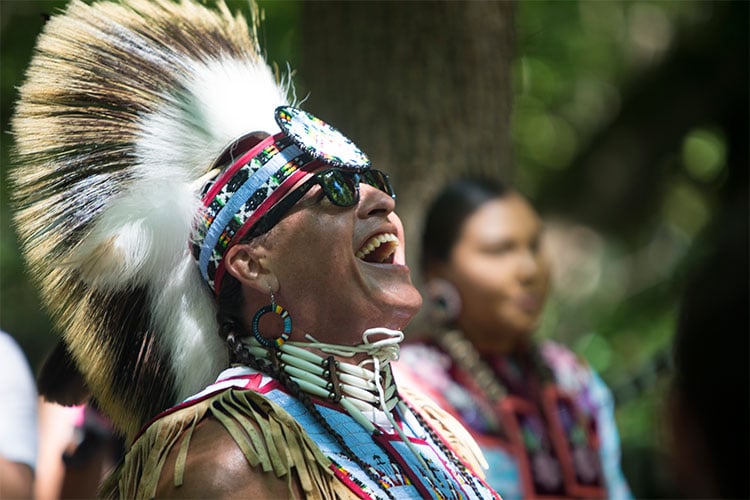
Having shrunk the artist roster yet again, the year’s crop of Milwaukee musicians was smaller than ever, but this did afford the members of Field Report ample opportunity to branch out in many different directions. Right off the bat on Friday, drummer Devin Drobka introduced what would be a weekend-long theme: if there’s a band you’ve never heard of listed on the schedule to play at one of the small stages in the woods, it’s probably some new project helmed by one of the year’s many, many artists in residency. Drobka (as Crumbs) was the first performer at the stage dubbed The Trees, rapping away on a digital drum pad that emitted no sound from the stage, flanked by Chris Porterfield and Caley Conway on guitars. The sounds at this installation emanated from speakers mounted in the surrounding trees, giving the sonic illusion that the jazz/drone noise was coming from all around us in the surrounding woods. Moving from place to place around the stage could create an entirely new listening experience, even depending on how many tree trunks got between a speaker and one’s ears. It was a uniquely immersive experience, and Crumbs was one of the best-suited performances for this particular setting.
Confusion arose quickly, however, for fans searching for the installation known as The Jannette, a modified piano housed in a triangular wooden arch that was nowhere near where it was listed on the map of the grounds. Several of the fest’s bigger names performed here throughout the weekend, but there was scarcely room for a few dozen people to cram in around it, resulting in some serious foliage trampling by Saturday night. It’s possible that organizers expected a drop in attendance due to lack of star power, but none of the small stages offered enough space for fans at the busiest times. This was one of several logistical hang-ups that plagued IV.
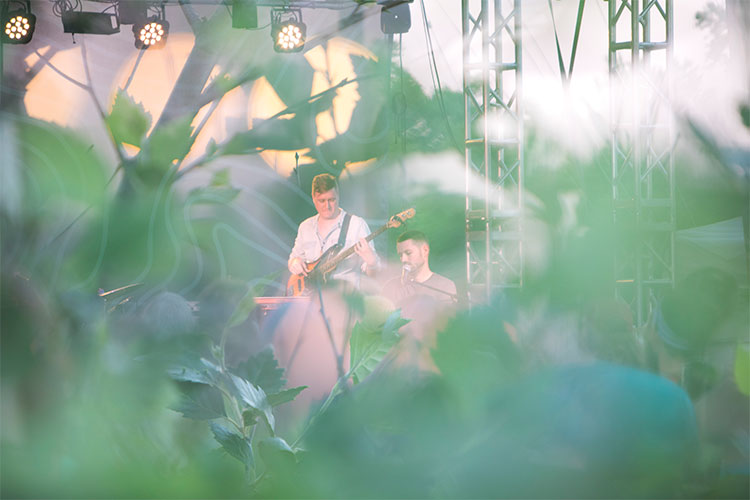
In fact, most of the issues that arose last year went unaddressed. Lines for food and portable toilets remained lengthy at most times, and beer selections were limited to four New Belgium pale ales or Fat Tire. Perhaps most frustrating was even less musical variety. One of Eaux Claires’ biggest selling points is the phenomenal sound systems on the main stages, but this year’s lineup could hardly take full advantage. Previous years’ earth-shaking bass at triumphant sets by acts like Danny Brown, Sylvan Esso, and Vince Staples seemed like distant memories; while many performers throughout the weekend gently encouraged fans to dance, some more danceable music might’ve been a more effective inspiration. The scant available rap this year was all relegated to the sides, while the main stages stayed very quiet and subdued until very late in each day.
Although there wasn’t much sound from the main stages bleeding into the woods, competition between The Trees and the nearby Oxbeaux Stage frequently drowned out beginnings and ends of sets. The layout being more compact than ever added to an overall feeling that Eaux Claires is closing in on itself. While in past years, bold and weird varieties of music challenged fans to expand their expectations, there wasn’t much to challenge anyone this year. The return of Swamp Dogg was one of the few surprises; after a surprise one-song appearance last year, he got his own set at the House Of IV stage on Friday afternoon, and it was a delightful one. “I been ’round to the stores,” said the 75-year-old soul iconoclast, “and I bought me a dozen Levitra, a dozen Viagra, and a fifth of Hennessy…” Although he was rarely heard, Vernon sat in at the side of the stage for most of Swamp’s set, clearly giddy during the epic “Total Destruction To Your Mind,” and when the cantankerous legend’s set ended, Vernon rushed out for an enthusiastic embrace.
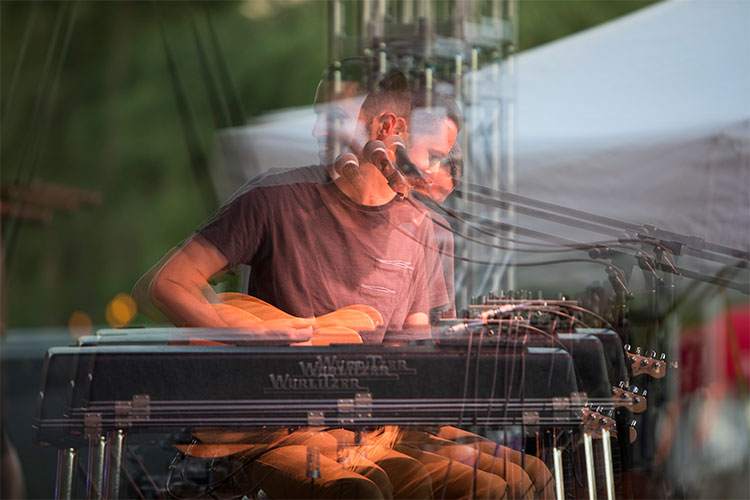
Shortly after this, Memphis singer/songwriter Julien Baker took to the Lake Eaux Lune stage for a stunning set of her celebrated, heartbreaking tunes. As a performer, she’s got an energy that makes you wonder if most singers feel their own songs anywhere near as deeply. For anyone who needed a good cry to kick their festival experience into high gear, this was the golden opportunity; even tempered by Baker’s goofy enthusiasm between songs, her voice and lyrics cut to the soul, and this set alone would’ve made her one of the festival’s MVPs. Fortunately, she took full advantage of her rising-star status, gracing almost every possible stage on the grounds at some point throughout the weekend.
Baker’s next appearance occurred at the Music Box Village, a jungle-gym/treehouse-looking thing that had taken the place of the Decorum stage from last year. Throughout the weekend, fans could tinker around on the installation (among others), which was basically an elaborate percussion instrument—bang on the stairs, railings, walls, or whatever, and you were making a beat; if you were feeling ambitious, you could sample and loop, and there were even microphones to mess around with. Predictably, it was usually a chaotic mess, but Baker, joined by Australian singer/songwriter Gordi (Sophie Payten), managed to turn out some fairly interesting sounds once they got past the fiddling-around stages.
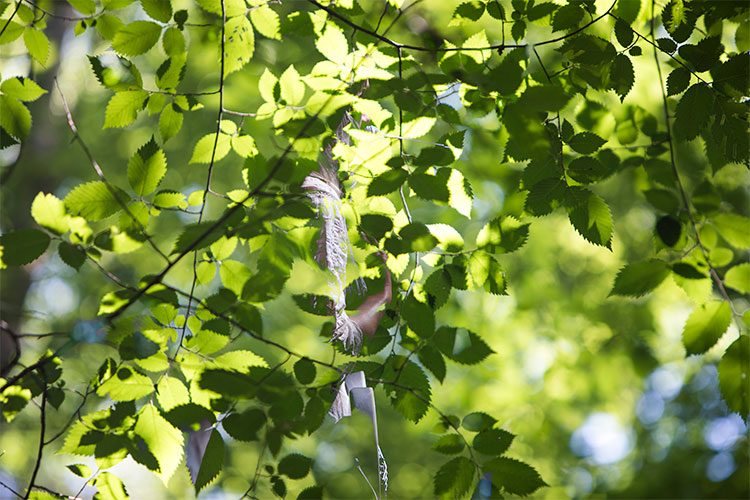
Field Report’s scheduled set took place early Friday evening, and featured, to the surprise of many, Caley Conway herself on guitar and vocals. Chris Porterfield seems to delight in choosing new band members who will make an immediate impact on the sound and direction of the band, and the addition of Conway is no exception. The band has never really paused to stabilize since its inception, and this performance found Devin Drobka incorporating his analog and digital drums like we’d never heard before, with varying degrees of success. It was like witnessing the band gradually gel over the course of the set; by “Everything I Need,” the full force of the band was staggering, and Mark Waldoch joined in for a riveting performance of “Summertime.” We’re still hoping to find out how this powerhouse lineup could reimagine some of Porterfield’s older gems.
Another major highlight of Friday was serpentwithfeet‘s enchanting set at the House Of IV stage. The experimental R&B singer has a rambling, confessional style that suits his acrobatic voice surprisingly well. He comes off a bit like what R. Kelly always pretended to be: an emotional storyteller, twisting poetry and prose into music that blurs the line between composition and improvisation. He brought out fellow outsider-soul crooner Moses Sumney at the end of his set; between this and Sumney’s un-categorizable performance the following afternoon, the two produced probably the weirdest and most sophisticated music of the weekend.
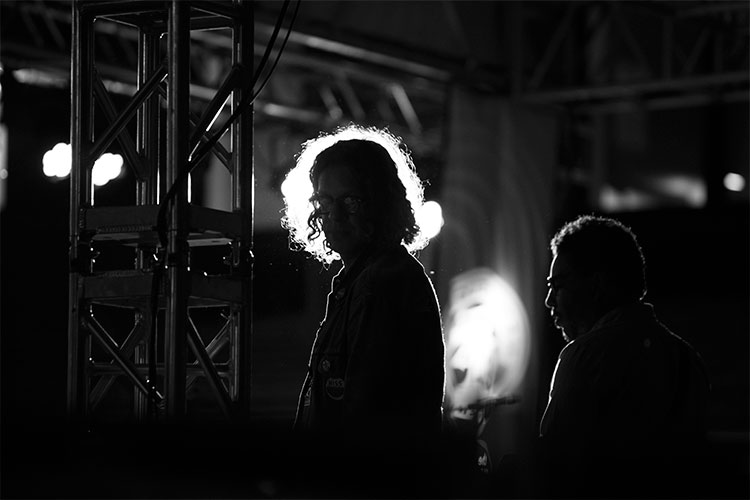
Following a typically impressive/hilarious performance by Chicago rapper Serengeti (backed by perennial Eaux Claires utility man Andrew Broder), the Vernon/Dessner supergroup Big Red Machine took to Flambeaux, seeming much more like a legitimate band than ever before. The songs were less on the experimental side than Vernon’s recent Bon Iver material; they were focused, dynamic pieces of indie/post-rock that kept the crowd pretty well entranced. Vernon never switched off the Auto-Tune even when addressing the crowd directly; “I hope you all feel safe,” he remarked at one point, and it was difficult to tell if he was being ironic or not. We began to get the feeling that part of Vernon’s overall vision for his career and this festival is exposing and redefining the role of technology in our lives. He knows that heavily processed vocals bug the shit out of some people; perhaps he’s playing with the duality of digital intrusion, whether it’s music or social media or whatever. We have to learn how to deal with it and make sense of it, and Vernon is perpetually forcing the issue, whether intentionally or not.
To close things out on an increasingly mosquito-infested first night, Mouse On Mars performed material from their new album Dimensional People, featuring many of the dozens of contributors to the album itself (including a nightcap by Swamp Dogg!). It was a sometimes propulsive, sometimes disorienting set of very experimental, noisy music; the crowd dwindled as it went on, most unable to sustain momentum as the beats swelled and dissipated rather unpredictably. Porterfield took the stage in the final moments to lead an attempt at Woody Guthrie’s “All You Fascists Bound To Lose;” he’d have more success sinking this song into the group mind on Saturday at the Music Box, but at this point people may have been hoping for something familiar to grab hold of, and this set had nothing of the sort.
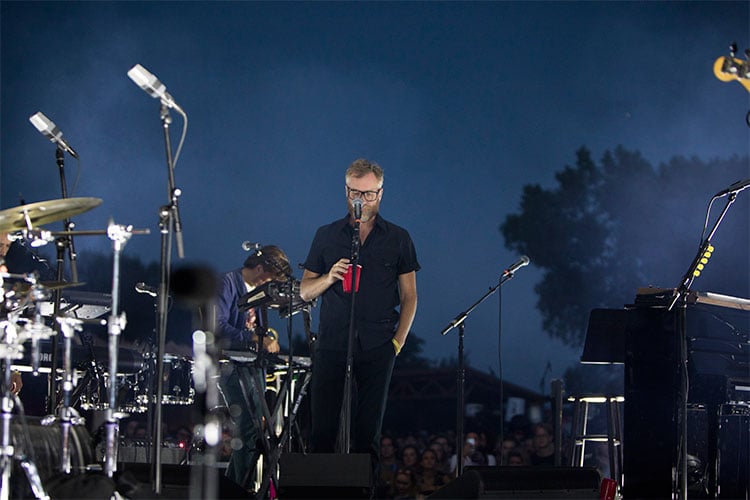
The big challenge of Saturday was catching Julien Baker anywhere she might happen to pop up, and there were too many opportunities to even catalog. The day opened with the Eaux Claires Women’s Choir: Baker, Payten, Conway, Anaïs Mitchell, Channy Leaneagh (of Poliça), Kristín Anna Valtýsdóttir, and Phoebe Bridgers, singing covers and trying valiantly to get the crowd involved, but the only song everyone seemed to know was the Carter Family staple “Keep On The Sunny Side.” Having essentially taught each other this handful of tunes just prior to the set, the impromptu sextet nevertheless started the day off beautifully, even if their tastes ranged a tad too obscure for rousing singalongs.
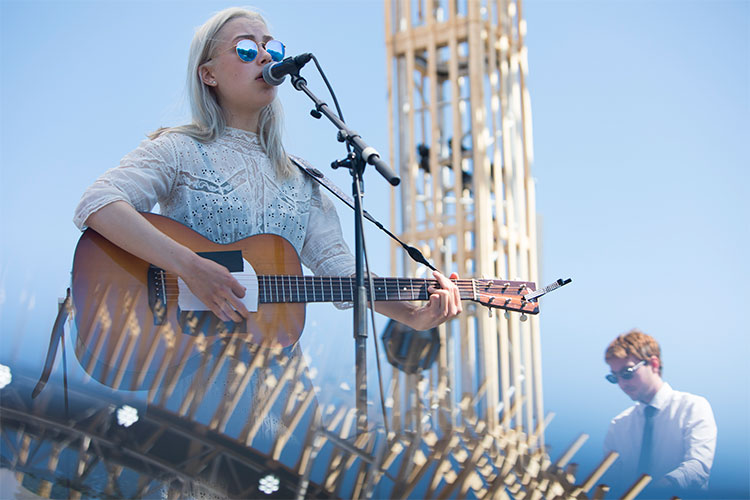
Baker popped up next at the Oxbeaux stage during Broder’s incredible “Mix Tape” set, which was augmented by Iron Boy and a whole slew of other guests. Of all the performers trying to get people to dance, Broder actually made it happen; the crowd merged with Iron Boy in some afternoon revelry as Broder essentially remixed his own and his guests’ tunes into sprawling dance tracks without taking any unwarranted liberties. It was an inspired and eclectic set that embodied the Eaux Claires spirit as well as any other. “I was gonna do a long speech about what this is all about, but…this is what it’s all about,” he said towards the end of his set. “I’m just Andy.”
Baker and Payten did another collaborative set later at The Trees, producing one of the most memorable sets of the weekend (once Baker got her pedal board working properly). This was more focused on Gordi material, with Baker providing a layered, psychedelic drone on guitar and some improvised vocals, a haunting din that wrapped up too quickly, as Baker had to rush over to The Jannette for another set with Thomas Wincek. By this time, Russian hyper-political post-punks Pussy Riot were already making a racket on the main stage. All dressed in fluorescent green masks, the ladies injected a much-needed dose of adrenaline into the proceedings; it was as much a call to action (with much visual translation on the screen behind them) as a performance of music, and it was safe to say there weren’t many right-wingers in attendance to object.
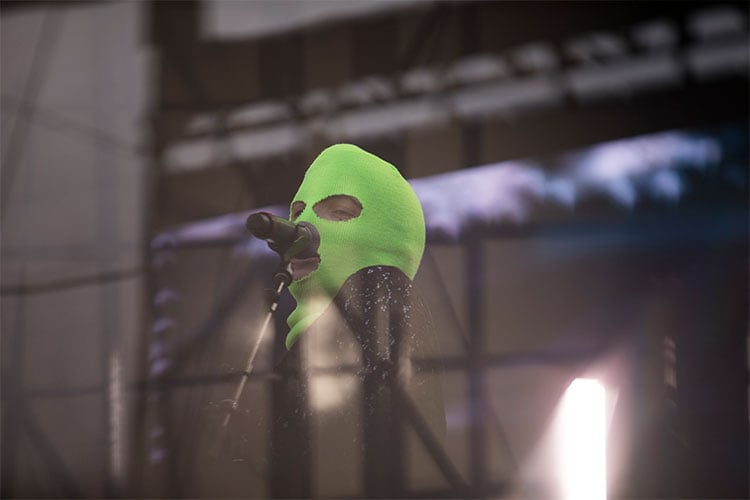
As the oppressive sun finally set on Foster Farms, The National took to the Flambeaux. Many fans may have been hoping for a full performance of the band’s 2007 breakthrough Boxer, which had occurred recently at select European dates, but no dice; it was mostly new material, including at least three brand-new unreleased songs. Collaborators included Broder, Bridgers, Mouse On Mars, and most memorably, Baker, who appeared on a satellite stage in the midst of the crowd to sing her own “Appointments” and then help out on “Fake Empire.” Traditionally a vehicle for singer Matt Berninger above all, The National rose to the occasion as a band more than we’d ever witnessed, and Berninger simply seemed grateful to be there in the thick of it. Of course, he stalked the round stage earnestly as he got the masses to finish the set off themselves with “Vanderlyle Crybaby Geeks.”
The grand finale was listed as PEOPLE Mix Tape—a reference to the in-development streaming service/publishing platform that Vernon and Dessner have just launched. Onstage, Vernon played MC for a host of guests, including a lengthy spot by Naeem (a.k.a. Spank Rock), and virtually every artist who was still around, at some point. It was as scattered and undisciplined as you’d expect, but mostly quite engaging, closing out with a reprise of the Women’s Choir performing Gillian Welch’s “Everything Is Free,” a mild protest song of sorts about the state of the music industry.
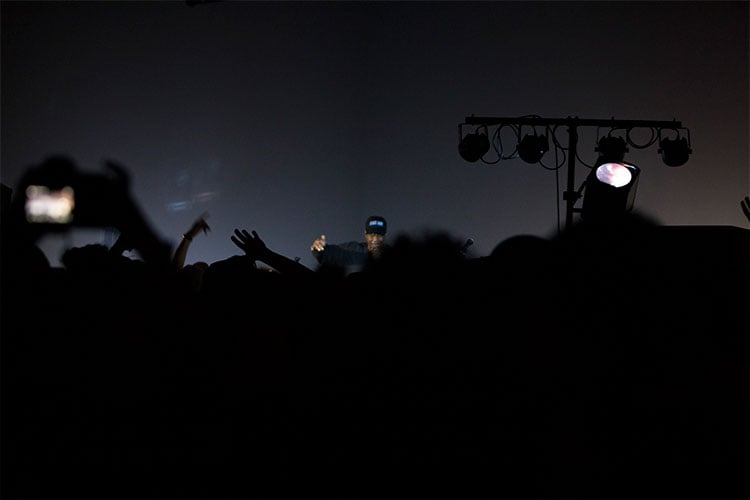
In the end, it was somewhat odd that there weren’t more feats of activism; perhaps the information-fatigue of modern life had crept in, but more than ever, Eaux Claires felt like an insular retreat, a respite. Our thoughts kept going back to something Porterfield had said towards the end of Field Report’s set on Friday:
“It’s hard to know where to begin. You can’t flip a switch and change everything. But what we can do is, literally, one person to one person: be kind, be loving, be curious. And if we all do that, I believe that energy, honest to God, I believe that energy is multiplied. I believe there’s something unquantifiable about the act of love, for lack of a better word.”
This feeling of community and group consciousness was echoed by performer after performer throughout the weekend, and for those who aren’t willing to give in to this sort of metaphysical mindset, Eaux Claires will be a tough sell. It’s still got the essence of what has always set it apart from other festivals, and the overall quality of the music was still at a premium, but festival-goers do, from time to time, crave something familiar and comforting and invigorating to latch onto, and there was precious little of that at IV. Vernon and Dessner have always challenged their audience to give in to a very un-commercial, unorthodox vision; time will tell, but this year they may have been asking a bit too much.
